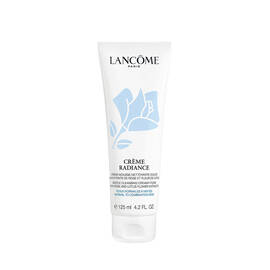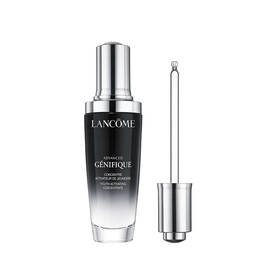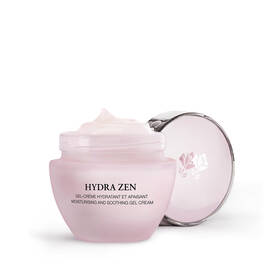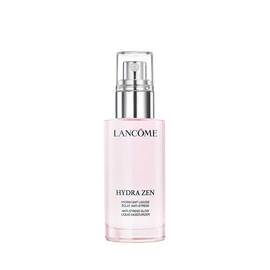Maskne, Skin Dryness, Skin Irritation: How Face Masks Could Impact Skin
Learn how wearing face masks can contribute to maskne, skin dryness and irritated skin. Create a gentle skincare routine at Lancôme.

If you’ve diligently been wearing face masks, as recommended by the Center for Disease Control1, you might have noticed some changes in your skin’s appearance, such as dry skin on your face. It’s not just coincidence. Wearing masks frequently or for extended periods may create a hot, humid ecosystem on the face’s surface, trapping in moisture, sebum and particles from your breath. That combination could result in visible changes to the skin’s appearance, such as maskne, skin dryness and irritated skin.2
Maskne, short for “mask acne,” describes the phenomenon of breaking out from wearing masks. But maskne is not just your average acne. These pimples are called acne mechanica, a type of acne caused by friction or rubbing (versus acne vulgaris, which is caused by a combination of sebum, hormones and bacteria).3
But it doesn’t just end with maskne. Wearing protective face masks for long hours at a time may also lead to skin dryness and tightness as well as tenderness and skin rashes.4 This skin irritation may result from the constant rubbing and friction of the mask, and over time could compromise the skin barrier — which serves as skin’s first line of defense against external irritants.5 Not only that, but when the skin barrier is impaired, moisture can evaporate more easily, which could contribute to skin dryness and even dehydrated skin.
Fortunately, a few tweaks to your usual skincare routine can go a long way in helping your skin especially if you are wearing a face mask all the time.
Wash Your Face After Wearing a Face Mask
It doesn’t matter whether it’s the middle of the day or not — once you’re home and can safely remove your mask, wash your face with a gentle cleanser that won’t exacerbate any dry skin on the face. It can help rinse away any sweat and sebum that has collected beneath the mask on the skin’s surface.6 We recommend using Crème Radiance, to help purify and soothe skin.
Also, don’t forget to wash your mask, too. Germs, oils and particles from your breath are coming into constant contact with your face mask while you’re wearing it. Without regular washing, they can build up and potentially lead to irritated skin. The fix is easy: Wash your mask in hot water with a fragrance-free detergent after every wear or wear a disposable mask.
Have a Gentle Skincare Routine
Keep your overall skincare routine gentle, even when it comes to your face serum. Instead of peels and chemical exfoliants, focus on fortifying the skin barrier. Look for products formulated with ingredients like ceramides and hyaluronic acid. Advanced Génifique Face Serum contains a combination of ceramides, hyaluronic acid and Bifidus Prebiotics, improving hydration in just one use. Plus, it also helps with skin moisture barrier recovery over time.
Moisturize Before and After Wearing a Mask
No matter your skin type, it’s important to use moisturizer for dry skin regularly, even when you’re wearing a mask — and not just in the morning and at night. Rather, if you find yourself dealing with skin dryness from wearing a face mask on a daily basis, try applying moisturizer before and after putting your mask on. This helps create a protective barrier between your skin and the mask.7
You can choose your ideal moisturizer for dry skin based on your skin type. Here are our product picks:
- If you have oily or combination skin, a gel moisturizer like Hydra Zen Anti-Stress Gel Cream is a good bet; the oil-free moisturizer with hyaluronic acid provides 24-hour hydration, revealing skin that feels smoother and more comfortable without a greasy or sticky sensation.
- If your skin is naturally dry or sensitive, we recommend Hydra Zen Liquid Moisturizer. The deeply hydrating formula helps improve the appearance of stressed skin, such as skin redness and irritated skin.
Choose Your Mask Wisely
Not all face masks are created equal. While healthcare workers might require medical-grade masks, there’s a big range of options available for everyday wear. Choose a face mask in a soft and breathable material, such as cotton, which can help with sensitive skin or those prone to maskne. Masks that don’t fit well can slide around and could lead to irritated skin, while face masks made of synthetic fabrics may even contribute to maskne.8
1 https://www.cdc.gov/media/releases/2020/p0714-americans-to-wear-masks.html
2 https://www.jaad.org/article/S0190-9622%2820%2930392-3/fulltext
3 https://pubmed.ncbi.nlm.nih.gov/123732/
4 https://www.aad.org/public/everyday-care/injured-skin/burns/face-mask-skin-problems-treatment
5 https://www.ncbi.nlm.nih.gov/pmc/articles/PMC7102542/#s0015title
6 https://www.cedars-sinai.org/newsroom/dermatologist-says-skip-the-maskne-not-the-mask/
7 https://www.aad.org/public/everyday-care/skin-care-secrets/face/prevent-face-mask-skin-problems
8 https://www.aad.org/public/everyday-care/skin-care-secrets/face/prevent-face-mask-skin-problems





